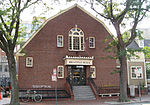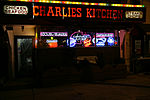Harvest (Harvard Square)
Harvest is a Harvard Square restaurant originally owned in 1975 by Benjamin Thompson (architect) (he designed it as well) and his wife Jane. They closed in 1997 because of “growing competition and poor management” but reopened under new management (past managers R. Patrick Bowe and Jayne Bowe) and renovations by Elkus Manfredi. The current owner is Chris Hummel.Harvest offers “upscale, contemporary, seasonal New England cuisine.”The restaurant was known for its Marimekko prints in the front room and the neon Harvest sign and attracted customers such as Julia Child (it was rumored to be “her favorite place to dine”). They hosted Child's 90th birthday party in 2002.Alumni of their kitchen include Lydia Shire, Barbara Lynch (restaurateur), Bob Kinkead, Sara Moulton, Jasper White (chef), Chris Schlesinger and Frank McClelland.
Excerpt from the Wikipedia article Harvest (Harvard Square) (License: CC BY-SA 3.0, Authors).Harvest (Harvard Square)
Brattle Street, Cambridge
Geographical coordinates (GPS) Address Nearby Places Show on map
Geographical coordinates (GPS)
| Latitude | Longitude |
|---|---|
| N 42.37373 ° | E -71.12187 ° |
Address
Architects' Corner
Brattle Street 44;48
02138 Cambridge
Massachusetts, United States
Open on Google Maps








